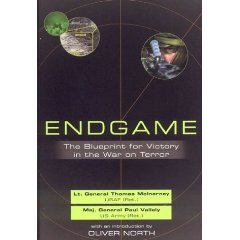The author, who has the advantage of being a senior CIA analyst with access to what secrets we do have, has produced what may well be the single most important book in terms of getting this country back on track in relation to the rest of the world. This is the second of three “must read” books I am reviewing today. The first, which sets the stage for this book by providing a truly inspired, informed, extraordinary, and nuanced review of the “just causes” for Muslim radicalization against the USA, is by Mahmood Mamdani, Good Muslim, Bad Muslim: America, the Cold War, and the Roots of Terror The third, best read last, is Paul L. Williams' Osama's Revenge: THE NEXT 9/11 : What the Media and the Government Haven't Told You The latter books paints a compelling portrait, using only open sources of information, on how likely it is that Bin Laden not only has a number–perhaps 20 or more–nuclear devices of one sort or another–but is also receiving technical assistance from Pakistan, Iran, North Korea, and certain Russians in refreshing and maintaining those devices for use within the US homeland to create a “nuclear hellstorm” (Al Qaeda's words).
This book, the second of two by the same person, but easily the most relevant to the salvation of the American dream and homeland, is a tour d'force. It is an incredibly thoughtful, well-ordered accounting of both our mistakes and both the rationality and inevitability of Bin Laden's victory over the US. The endnotes are world-class.
As Congress prepares to confirm a new Director of Central Intelligence, the author's frequent and articulate damning of the U.S. Intelligence Community leadership for its moral cowardice (specifically slamming George Tenet and also Richard Clarke, who is labeled “blusterer in chief”) must, in my view, require that the nominee for the position of DCI promise to clean house as a condition of his confirmation. Above the rank of GS-15, every Senior Intelligence Service officer should be put on probation by the incoming DCI, and half of them should be retired within 2-3 years. The author of this book knows what he is talking about.
The author very usefully slams (on page 175) Michael O'Hanlon from the Brookings Institute, William Hawkins from the Army War College, and Anthony Davis of Jane's Intelligence Review for their absolute misreading of the situation in Afghanistan. it is helpful to emphasize that these and other so-called experts that Congress tends to rely on, are absolutely superb when they do their homework (O'Hanlon is top notch on the non-revolution in military affairs, for example), and very dangerous when trying to milk the issue of the day without doing their homework (on intelligence reform, for example).
I do not want to conclude without highlighting the author's praise for the Foreign Broadcast Information Service (FBIS). They appear, in this one instance, to have excelled at finding and translating every word uttered by Bin Laden and his key aides, in public and in Arabic, and the author–whom I respect completely–is profuse in his detailed thanks to FBIS. Although I and my leading military colleagues consider the FBIS model to be rotten at the core (marginal remote collection, not doing tribal languages or in-country gray literature, broadcasting generic reports largely useless in operational decision making) I do affirm that FBIS can and should be saved, if it can be re-oriented to do for all of its clients what it did for the Bin Laden task force.
In conclusion, I want to focus on what I believe is a misreading by many of the author's recommendation of a “scorched earth” campaign against Al Qaeda as a global insurgency (rather than a law enforcement challenge). Although the author is correct to suggest that such an approach is necessary if we wish to continue doing the six things that Bin Laden wants us to stop, I believe that most readers of this book go into instant denial and fail to see the author's logic, especially when he points out (page 17) that Bin Laden has explicitly stated that he does not desire to expand Islamic dominance beyond existing Muslim countries, and that he will follow us in DE-escalation just as quickly as he is following us in escalation.
What we need to do, according to Bin Laden:
1) End US aid to Israel and support a Palestinian state
2) Withdraw US/Western military forces (not business) from the Arabian Peninsula and all Muslim countries worldwide
3) End US engagement in Afghanistan and Iraq
4) End US support for oppression of Muslims by Chinese, Russian, Indian, and other governments (e.g. Philippines)
5) End US manipulation of oil prices through corrupt dictators
6) End US support for corrRogue Nation: American Unilateralism and the Failure of Good Intentionsupt Muslim regimes
I think this all makes sense, especially when you add the insights from the other 479+ books that I have reviewed, books such as Clyde Prestowitz's , Jonathan Schell's The Unconquerable World: Power, Nonviolence, and the Will of the People Derek Leebaert's “The Fifty Year Wound” and on and on and on. If our policy makers were willing to read and think for themselves, and not spend endless hours trying to leverage their perks and manipulate their more honest constituencies, it seems to me that we could a) get ourselves out of this mess; b) redirect half the national security budget toward global stabilization instead of selective occupation; and c) restore morality to both our global business practices and our global foreign policy.
Probably will not happen until two nuclear devices go off in America–one will be in a shipping container, the other in a Central Park. Just how stupid can America get? We'll have to wait and see–I don't see us getting any smarter.
The Looming Tower: Al Qaeda and the Road to 9/11 (Vintage)
The Road to 9/11: Wealth, Empire, and the Future of America
The Sorrows of Empire: Militarism, Secrecy, and the End of the Republic (The American Empire Project)
Failed States: The Abuse of Power and the Assault on Democracy
Confessions of an Economic Hit Man
Sleeping with the Devil: How Washington Sold Our Soul for Saudi Crude











